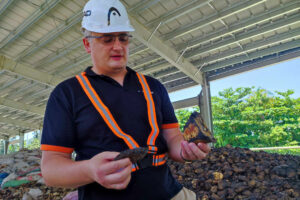Austrian tennis ball maker taps Mindanao for raw materials
PANABO CITY — Austrian tennis ball producer Head Sports will be sourcing its rubber cup lumps, the main ingredient for producing tennis balls, from some areas in Mindanao, according to its project consultant. Head Sports is eyeing to start operating and producing tennis balls in a couple of weeks on a five-hectare property at the […]

PANABO CITY — Austrian tennis ball producer Head Sports will be sourcing its rubber cup lumps, the main ingredient for producing tennis balls, from some areas in Mindanao, according to its project consultant.
Head Sports is eyeing to start operating and producing tennis balls in a couple of weeks on a five-hectare property at the Anflo Industrial Estate (AIE) in Panabo City, Davao del Norte.
Vasyl Goshovsky, the project consultant, said in an interview last week that the company will produce two million dozen tennis balls per year in the first phase, with production increasing to 14 million dozen per year in the final phase within two years.
He said the company will source its raw materials, specifically rubber cup lumps, from Cotabato, Zamboanga, and Davao de Oro.
“The Philippines is a very huge rubber producer in the world, and the Mindanao is producing almost half of all the rubber of the Philippines. We will find here a local produce of rubber from the farmers, and cooperatives. The provinces of Cotabato and Zamboanga are the biggest rubber producers in Mindanao and the Philippines. Also, we have some local suppliers from Davao de Oro and other provinces, and they are producing cup lumps of good quality so we will buy from them also,” Mr. Goshovsky said.
He said the initial volume requirement for the rubber cup lump is 300 tons per month to produce tennis balls.
“I think we will be growing and growing up, and we will finalize our production, and we will produce more tennis balls up to 500 tons per month,” he said.
Mr. Goshovsky said 60% of the tennis balls produced will go to their market in North America and the remaining 40% will be for the rest of the world such as Europe, Asia, New Zealand, and Australia.
“So, you can see our tennis balls all over the world, and you can buy it in any market in any continent,” he said.
He also said that the company chose to locate at AIE due to its proximity to the Davao International Container Terminal.
“We’re exporting plenty of our production 99% from the Philippines, which is very important to us and also it is a very good location, all the infrastructure already exists here. It is under the PEZA authority, which provides us with very good tax incentives and support, so that is why we chose AIE,” Mr. Goshovsky said.
AIE is a 63-hectare special economic zone accredited by the Philippine Economic Zone Authority and is owned and operated by Damosa Land, Inc. — Maya M. Padillo














